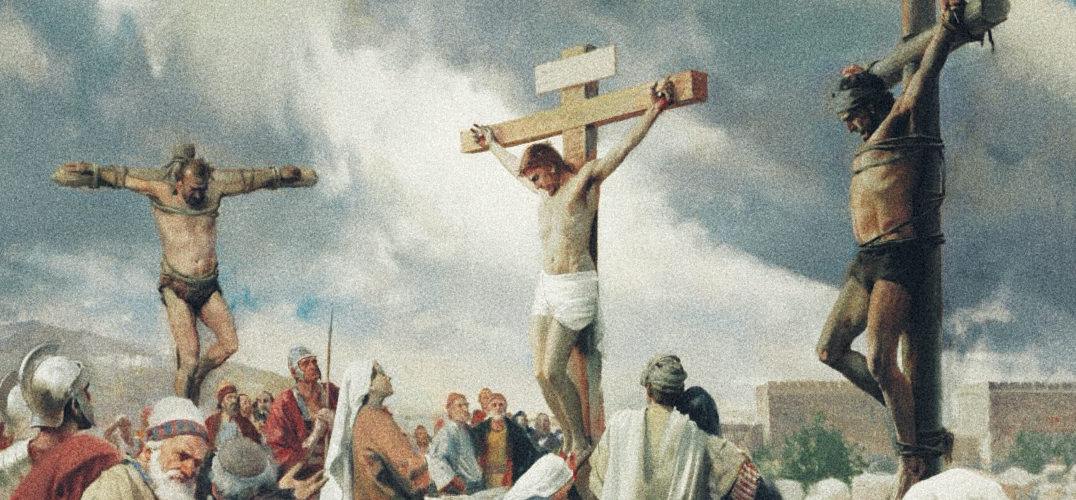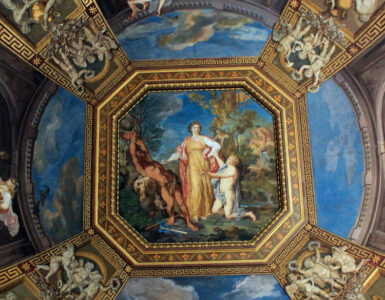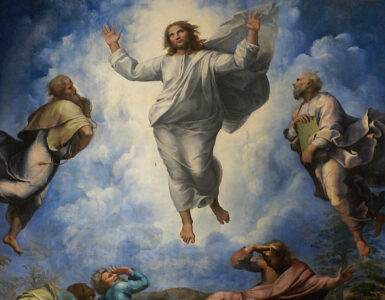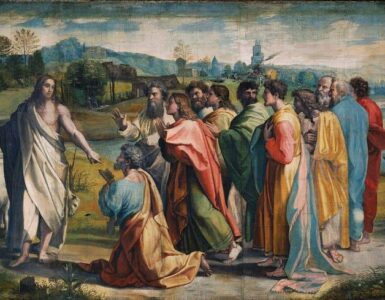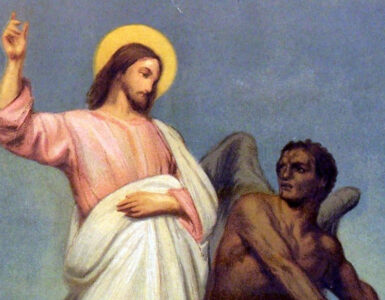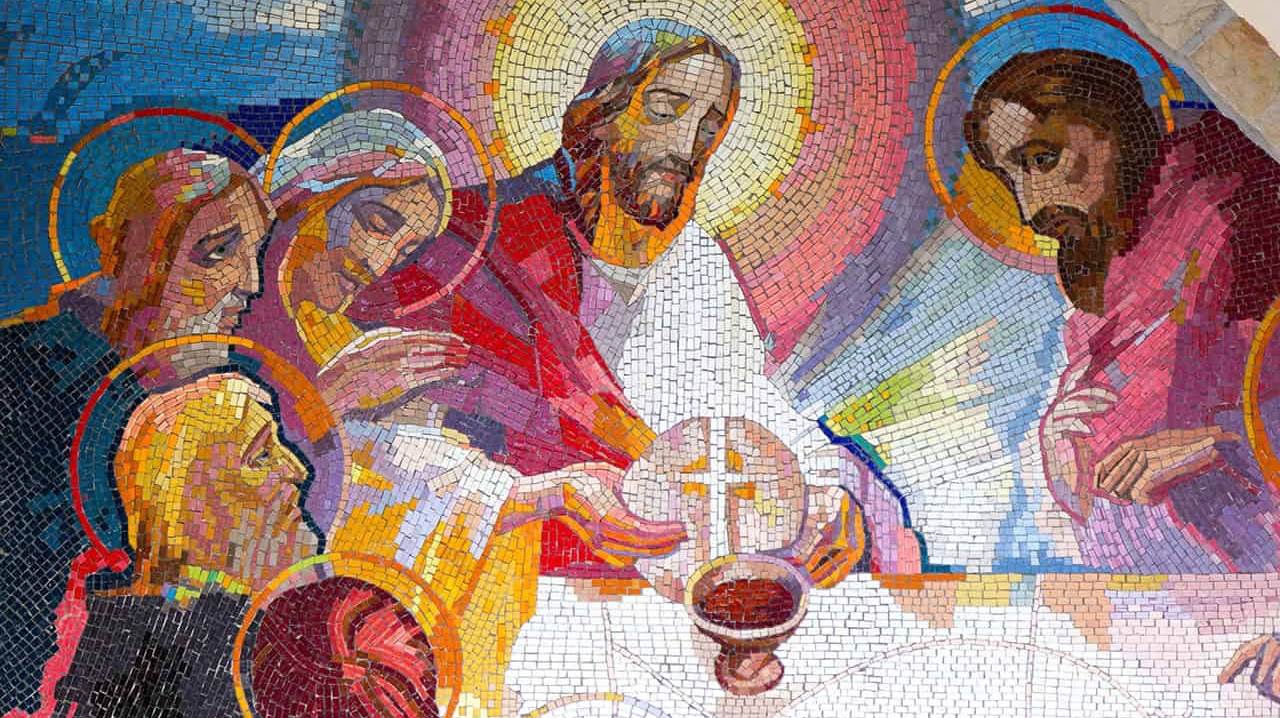In Bishop Fulton J. Sheen’s 1930 book,The Divine Romance, he ended with words about Jesus’ Last Sermon. Immediately, one might think back to his priestly ministry to his apostles and their growing flock. The Bishop quickly dispels this notion by citing that Jesus’ Seven Last Words from the Cross, taken as a whole, constituted His Last Sermon. After looking at them in the Bishop’s context, I believe that Jesus’ last sermon on earth provide us with a clear insight to His teachings and short life on earth.
The Seven Last Words were a constant source of inspiration for the Venerable Bishop. In fact, he often used them as the basis for his brilliant sermons, which he often delivered on Good Friday. By their very nature, they make an excellent source for meditation and spiritual reflection. I remember attending one such talk at my first parish and school, Our Lady Queen of Martyrs, on Queens Boulevard in New York City. I think I was home for Spring Break from Holy Cross.
I do not remember many specifics but what has stayed with me ever since is the light of sanctity that emanated from the pulpit while the Bishop was speaking. I wish I had been a little bit closer, so I could have focused on his luminous eyes that people have said could look directly into people’s hearts. Bishop Sheen was the first of a handful of people, I have experienced, who could illuminate an entire room or even a church or auditorium, just by the force of their spiritual nature. Mother Teresa, whom I saw at a Cardinal O’Connor Mass in New York’s St. Patrick’s Cathedral, circa 1984, was the first who comes to mind.
To assist me in this piece, I found an excellent essay, on The Seven Last Words, unsurprisingly written by the Archbishop. It provided me with a banquet of food for thought. He begins by talking about the three elements that comprised every great message, namely a pulpit, an audience and a truth. The Bishop proceeds to say that these three elements were present in Jesus’ first and last sermon, which He delivered to mankind.
The first one took place on a pulpit on a mountain side. Better known as The Sermon on the Mount, His audience was mostly unlettered Galileans. His truth was the Beatitudes. The Gospels do not give the name of the Mount, just that it was on the outskirts of Galilee. The pulpit of His Last Sermon was the Cross. The audience was comprised of saints and sinners and the sermon was the Seven Last Words.
In the 4000 years of Jewish history, the dying words of only three people have been preserved for history, namely Israel, Moses and Stephen. Jesus has left us His dying words, which have lasting value, more so than any of the others in Jewish history. In Sheen’s words, they are representative of all humanity. In His last hours, He calls all of us to the pulpit of His Cross. As he ends his introduction, Bishop Sheen says:There never was a preacher like the dying Jesus. There was never a congregation like that which gathered at the foot of His Cross. There was never a sermon like ‘the Seven Last Words.
The First Words of Jesus: Father Forgive them for they know not what they do! Jesus taught His followers to Love their enemies. This is the essential meaning of His first dying words from the pulpit of His Cross. Jesus had been mistreated by His fellow Jews who clamored for His death because they feared that He was a threat to their earthly power. In other words, they were ignorant of or had not listened to a word of His teachings.
Pilate had also feared Jesus at first. He was terrified that Jesus’ followers would rise up against the Jews and he would be caught in a civil war. This would not look good on his resume. Jerusalem was not a desirable position for any Roman interested in advancing in the Empire. In truth, Jerusalem was like the last outpost in a career. Failure in Jerusalem could have fatal consequences for the distressed Roman official. In the most famous act of cowardice in history, Pilate washed his hands of this Man and handed Him over to his Roman executioners to suffer crucifixion, the most heinous punishment any human could suffer.
Jesus’ forgiveness extended to Barabbas, the prisoner who was freed in place of Jesus, and of course to Pilate, and his Roman soldiers who hung Jesus on His Cross. This is not to forget Herod the Great, the King of Judea and all others in the Sanhedrin whose blood lust caused them to cry repeatedly: Crucify Him, Crucify Him!
The Second Words of Jesus: This day thou shalt be with Me in Paradise. These words were extended to the Good Thief, on His right. It is an oxymoron which applied to Jesus’ forgiveness of Dismas, who was just one of the few people who empathized with Him since His arrest. His own apostles had fled Him. Judas had betrayed Him. Peter his right-hand man had denied Him three times as Jesus had predicted.
Only Veronica during the Stations of The Cross tried to relieve his suffering by wiping His bloodied face. St. Dismas knew Jesus was innocent and recognized his Divinity. As a result, he begged the Lord to forgive his sins and think of him when He entered paradise. Consequently, Jesus’ escort to Heaven was a thief. Bishop Sheen has always called DismasThe Thief that stole Heaven.
The Third Words of Jesus: Woman, behold thy Son. The Bishop calls these words, the Second Annunciation and also His Second Nativity. From high up on His Cross, Jesus expresses His Last Will and Testament. He had already given His blood to the Church. His garments went to his enemies who threw lots for them. He opened paradise to a thief. He would soon commend His body to a tomb. This left only His two early treasures, His mother and his young apostle John. He bequeathed them to each other.
At this moment Mary is undergoing the pains of childbirth, which the Bishop has called the second Nativity. While she had borne Jesus without labor in a Bethlehem cave, now she was birthing her son, John in the labors of the Cross. She is also undergoing birth pains, not just for John but also for the millions of Christians who will be born to her in the Christian age as the Children of Mary. Like John, they would not be her child in the flesh but in the blood of her Son. Now we can fully understand why Jesus was called her First-born, dispelling all notions that Jesus had blood brothers and sisters.
At this point, Bishop Sheen explores the Annunciation to His mother Mary and traces her relationship with her Son through Jesus’ childhood until Nazareth turned into Calvary and Jesus’ death on the Cross. Jesus had no greater fan than His Mother Mary. She had always been there for Him and His death was no exception. She stood patiently at the foot of her Son’s Cross until He surrendered His spirit. Just as Eve had lost her favor as the Mother of the Living at the foot of a tree because of her disobedience, Mary had earned her title of Mother of Men at the foot of her Son’s Cross. Bishop Sheen lastly adds that the nails from the shop became the nails of human malignity.
The Fourth Words of Jesus: Jesus mysteriously cries out Eli, Eli, I amma sabactheni. My God, My God! Why hast Thou forsaken Me? It is a cry in a mysterious language of Hebrew to express the tremendous mystery of a God abandoned by God. What a dramatic contrast from the Lord’s Prayer, Our Father who art in Heaven. According to Bishop Sheen, in some mysterious way Jesus’ human nature seems momentarily separated from His divine nature.
These words betray the sufferings of the God-man seemingly abandoned by God. When Jesus spoke these words, the skies turned a deadly black that covered the earth. This was a complete repudiation of the adage that nature is indifferent to the griefs of the world. The death of Jesus caused nature to revolt against itself, so profound was this special moment in history.
The Bishop lyrically describes this historical moment when God’s sun had failed to shine on the bloody death of His only Son. The light which rules the day had failed for the first and probably the last time in history, was snuffed out like a candle, when by all calculation, should have continued to shine. Bishop Sheen says that the reason for this was that the crowning crime of man could not pass without a loud protest from nature itself. If the soul of God was in darkness, so should be the sun which He made.
Just based on our own suspicions and even fears of normal darkness, one can only imagine what our Redeemer was feeling when everything around Him was shrouded in darkness. As Catholics we all know that darkness invites evil to visit. He had given up His mother and his beloved disciple and now His Father in Heaven seemed to have suspended Him in a dark space between Heaven and earth.
According to Sheen, all this happened in a vacuum. It is at this point Jesus assumes the tremendous weight of the world’s sins, including the sins of all atheists, murderers, blasphemers, child molesters and all down the line, including Christians who have turned their backs on Him. Immediately, the weight of the world becomes almost too heavy for His sagging shoulders.
The Fifth Words of Jesus I thirst betrays the sufferings of God abandoned by man. Jesus is not reproaching anybody but expressing in the depths of His humanity the natural truth that He is on the edge of dehydration and needs a sip of water. According to Bishop Sheen, the Creator cannot live without the creature. Mankind has collectively turned its back on its Savior in His hour of extreme need. He cannot live without His sheep. These words then signify the thirst of Christ’s love without the soul-water of Christians.
Certainly, Jesus has done all He can for His creatures. His body and spirit are exhausted by His slow and painful death. He feels emotionally drained, so it is no wonder He thirsts for the Love of His creations, having poured out all the waters of His everlasting Love on our poor parched hearts. Love is reciprocal yet we do not respond. Why do we let the Divine Heart die of His thirst for our human hearts?
The Sixth words of Jesus: It is consummated. When God created the universe, He willed that man and woman would be forever happy. He painted the skies blue and earth green. There was a garden, designed especially for human beings. But as the Bishop laments, in some mysterious way the revolt of Lucifer echoed to earth and the image of God in man was blurred and ruined. The Heavenly Father in all of His divine mercy willed to restore mankind to his pristine glory. To effect this, He willed to send His only Son to earth to redeem a fallen humanity.
In the divine economy of Redemption, the three things which cooperated in our banishment from Eden, cooperated in our Redemption. For the disobedient man, Adam, there was the obedient Man, Jesus Christ. For the proud woman, Eve, there was the humble virgin, Mary. For the tree of Good and Evil, there was the tree of Jesus’ Cross. We were bought and paid for, not with the five stones that David used to slay the giant Goliath but with the five wounds: hideous scars on Jesus’ hands and feet and His side. Father forgive them was Jesus’ fervent wish for us.
With His last breath Jesus had finished his soul-saving mission on earth. It was left to us to build upon the foundation of His Church, which He willed to us. We must live as other Christs, vowing to do His will on earth. Sheen concludes the section with a prophetic warning. While Jesus has enacted His consecration, the communion with Him depends on us and how well we relive His life and become other Christs. Otherwise, His Good Friday and His passion and death will do us no good unless we relive it in our own daily lives.
The Seventh and Last Words of Jesus: Father, into Thy hands I commend My Spirit. The first recorded death in History was that of Adam and Eve’s son Abel, who had been murdered by his jealous brother Cain. As a result of the Fall of Man in God’s Eden, Death was a human experience which none of us could escape. As the Bishop said, the sixth words were a farewell to earth while His seventh words were Jesus’ return to His home in Heaven. His salvific work was now complete.
Since then, centuries whirled through time like a hurricane ripping through fields. Jesus was the New Abel, killed for His innocence and goodness. Mary has remained at the foot of her Son’s Cross. In a while He will be taken down from the Cross and laid in the lap of the New Eve. In a few short days, Jesus will rise from the dead and it will mark the Death of Death. By His Resurrection Jesus has conquered death.
This is not the end of the Greatest Story ever told. Since then, God has not left us to fend for ourselves. Daily, He opens up the treasures of His divine forgiveness. All we have to do is ask Him for it. In addition, the sacraments of the Catholic Church remain as a reservoir of graces that will help the faithful endure the pains and tribulations of life on earth. Grace abounds in the Mass and its unbloody re-enactment of Jesus’ sacrifice on the Cross. We will never be alone and we should never be afraid as Jesus lives in us.


